Organisational Behaviour Report: Shell PLC and Employee Behavior
VerifiedAdded on 2022/12/28
|11
|2984
|27
Report
AI Summary
This report provides an in-depth analysis of organisational behaviour within The Royal Dutch Shell PLC (Shell). It examines how organisational culture, politics, and power dynamics influence individual and team behaviour and performance. The report explores Handy's Culture Typology, various types of power (legitimate, reward, coercive, expert, and referent), and Chanlat's characteristics of political behaviour to understand their impact on employees. Furthermore, it evaluates content and process theories of motivation, specifically Maslow's Hierarchy of Needs and goal-setting theory, to determine how motivational techniques can effectively achieve organisational goals. The analysis considers how Shell can leverage these theories to enhance employee motivation, productivity, and overall organisational success. The report concludes with a synthesis of the findings, highlighting the critical role of organisational behaviour in fostering a positive and productive work environment.
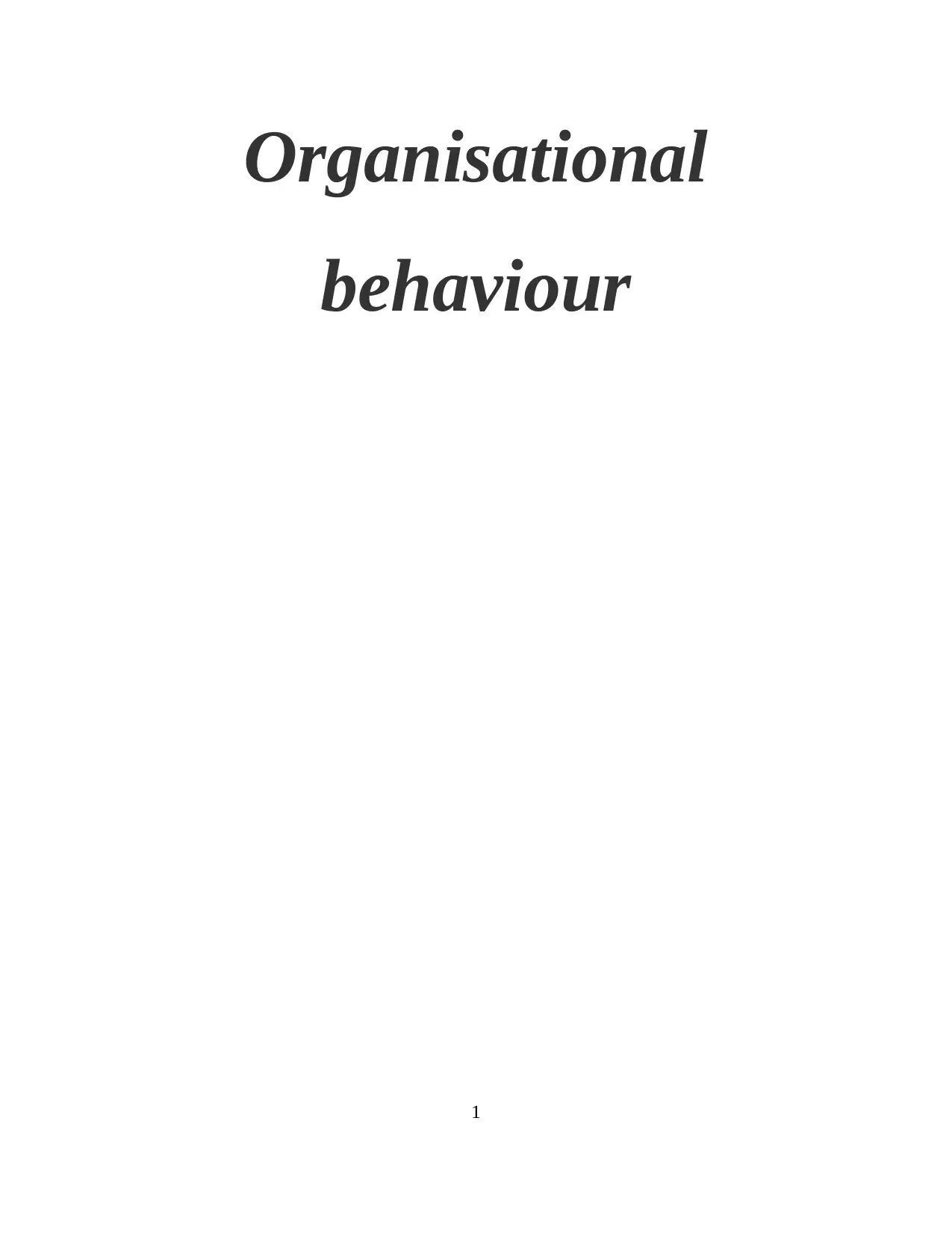
Organisational
behaviour
1
behaviour
1
Paraphrase This Document
Need a fresh take? Get an instant paraphrase of this document with our AI Paraphraser
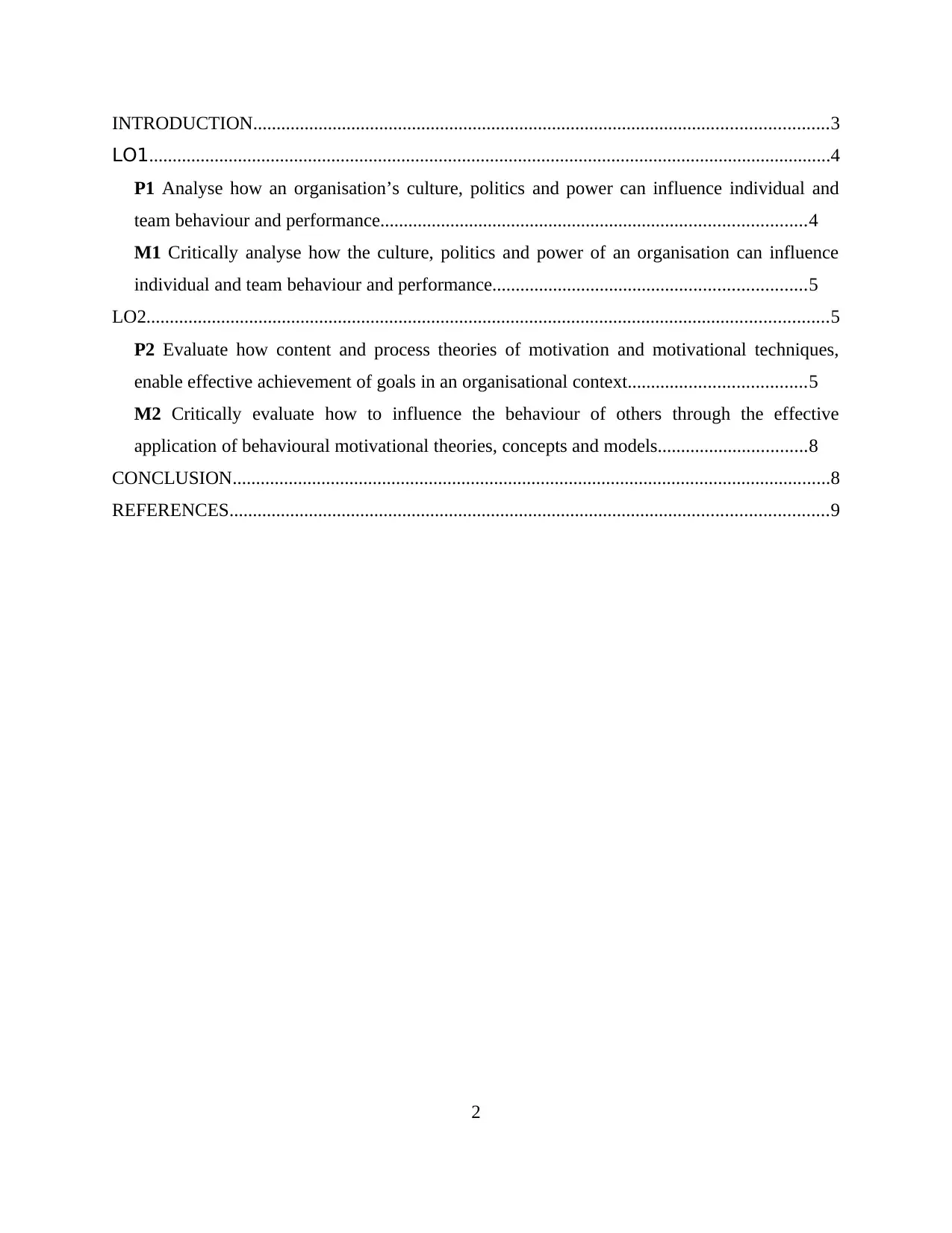
INTRODUCTION...........................................................................................................................3
LO1..................................................................................................................................................4
P1 Analyse how an organisation’s culture, politics and power can influence individual and
team behaviour and performance...........................................................................................4
M1 Critically analyse how the culture, politics and power of an organisation can influence
individual and team behaviour and performance...................................................................5
LO2..................................................................................................................................................5
P2 Evaluate how content and process theories of motivation and motivational techniques,
enable effective achievement of goals in an organisational context......................................5
M2 Critically evaluate how to influence the behaviour of others through the effective
application of behavioural motivational theories, concepts and models................................8
CONCLUSION................................................................................................................................8
REFERENCES................................................................................................................................9
2
LO1..................................................................................................................................................4
P1 Analyse how an organisation’s culture, politics and power can influence individual and
team behaviour and performance...........................................................................................4
M1 Critically analyse how the culture, politics and power of an organisation can influence
individual and team behaviour and performance...................................................................5
LO2..................................................................................................................................................5
P2 Evaluate how content and process theories of motivation and motivational techniques,
enable effective achievement of goals in an organisational context......................................5
M2 Critically evaluate how to influence the behaviour of others through the effective
application of behavioural motivational theories, concepts and models................................8
CONCLUSION................................................................................................................................8
REFERENCES................................................................................................................................9
2
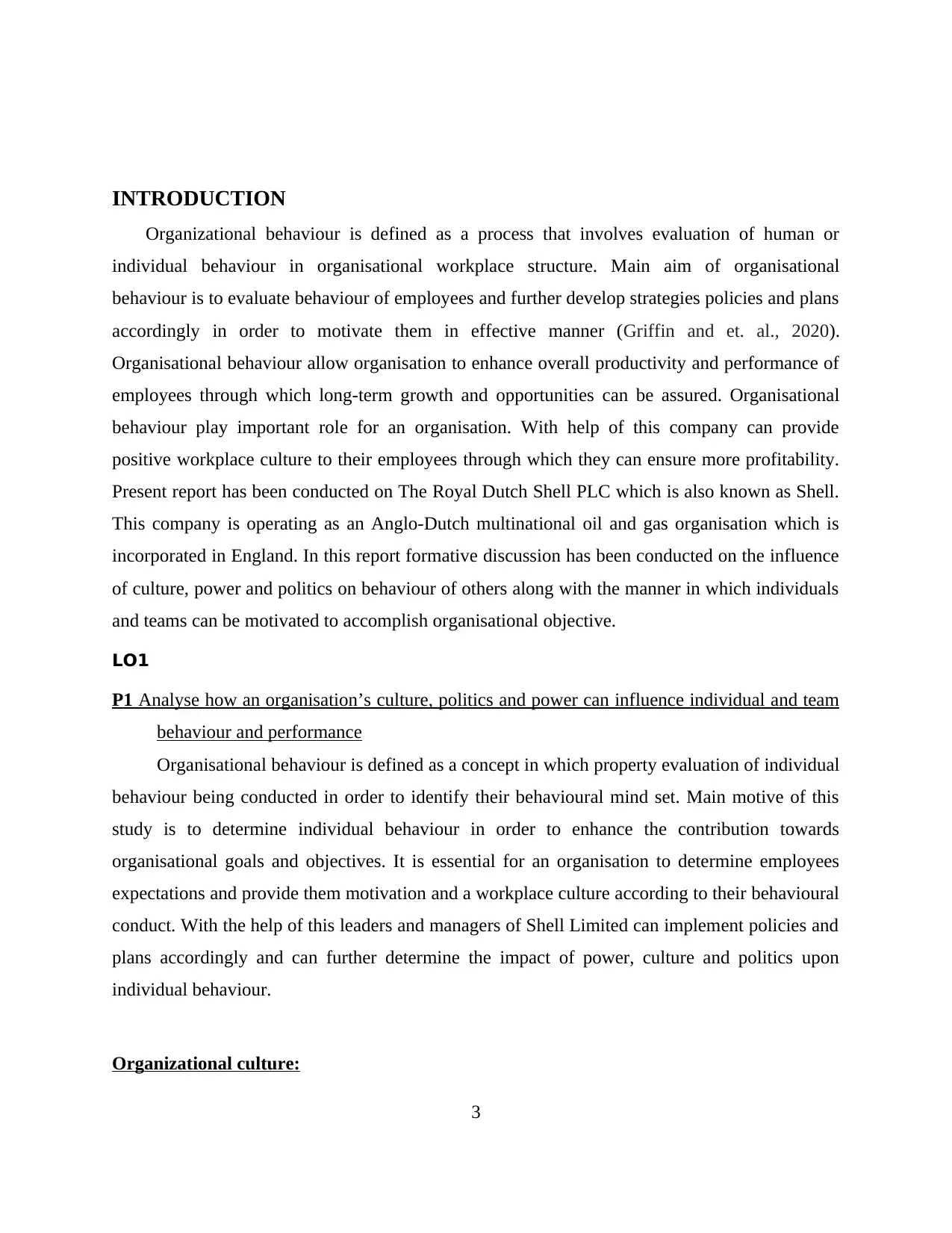
INTRODUCTION
Organizational behaviour is defined as a process that involves evaluation of human or
individual behaviour in organisational workplace structure. Main aim of organisational
behaviour is to evaluate behaviour of employees and further develop strategies policies and plans
accordingly in order to motivate them in effective manner (Griffin and et. al., 2020).
Organisational behaviour allow organisation to enhance overall productivity and performance of
employees through which long-term growth and opportunities can be assured. Organisational
behaviour play important role for an organisation. With help of this company can provide
positive workplace culture to their employees through which they can ensure more profitability.
Present report has been conducted on The Royal Dutch Shell PLC which is also known as Shell.
This company is operating as an Anglo-Dutch multinational oil and gas organisation which is
incorporated in England. In this report formative discussion has been conducted on the influence
of culture, power and politics on behaviour of others along with the manner in which individuals
and teams can be motivated to accomplish organisational objective.
LO1
P1 Analyse how an organisation’s culture, politics and power can influence individual and team
behaviour and performance
Organisational behaviour is defined as a concept in which property evaluation of individual
behaviour being conducted in order to identify their behavioural mind set. Main motive of this
study is to determine individual behaviour in order to enhance the contribution towards
organisational goals and objectives. It is essential for an organisation to determine employees
expectations and provide them motivation and a workplace culture according to their behavioural
conduct. With the help of this leaders and managers of Shell Limited can implement policies and
plans accordingly and can further determine the impact of power, culture and politics upon
individual behaviour.
Organizational culture:
3
Organizational behaviour is defined as a process that involves evaluation of human or
individual behaviour in organisational workplace structure. Main aim of organisational
behaviour is to evaluate behaviour of employees and further develop strategies policies and plans
accordingly in order to motivate them in effective manner (Griffin and et. al., 2020).
Organisational behaviour allow organisation to enhance overall productivity and performance of
employees through which long-term growth and opportunities can be assured. Organisational
behaviour play important role for an organisation. With help of this company can provide
positive workplace culture to their employees through which they can ensure more profitability.
Present report has been conducted on The Royal Dutch Shell PLC which is also known as Shell.
This company is operating as an Anglo-Dutch multinational oil and gas organisation which is
incorporated in England. In this report formative discussion has been conducted on the influence
of culture, power and politics on behaviour of others along with the manner in which individuals
and teams can be motivated to accomplish organisational objective.
LO1
P1 Analyse how an organisation’s culture, politics and power can influence individual and team
behaviour and performance
Organisational behaviour is defined as a concept in which property evaluation of individual
behaviour being conducted in order to identify their behavioural mind set. Main motive of this
study is to determine individual behaviour in order to enhance the contribution towards
organisational goals and objectives. It is essential for an organisation to determine employees
expectations and provide them motivation and a workplace culture according to their behavioural
conduct. With the help of this leaders and managers of Shell Limited can implement policies and
plans accordingly and can further determine the impact of power, culture and politics upon
individual behaviour.
Organizational culture:
3
⊘ This is a preview!⊘
Do you want full access?
Subscribe today to unlock all pages.

Trusted by 1+ million students worldwide
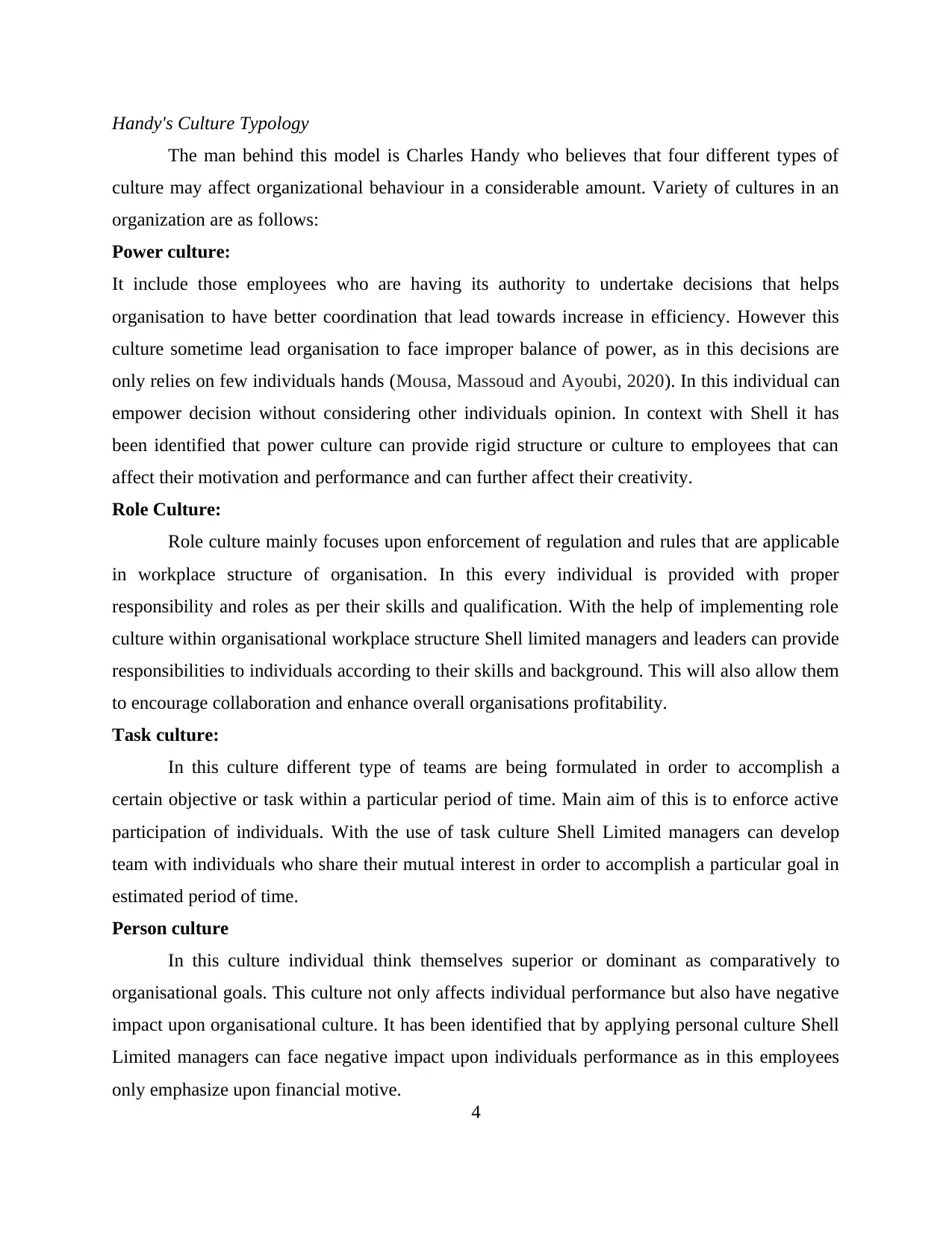
Handy's Culture Typology
The man behind this model is Charles Handy who believes that four different types of
culture may affect organizational behaviour in a considerable amount. Variety of cultures in an
organization are as follows:
Power culture:
It include those employees who are having its authority to undertake decisions that helps
organisation to have better coordination that lead towards increase in efficiency. However this
culture sometime lead organisation to face improper balance of power, as in this decisions are
only relies on few individuals hands (Mousa, Massoud and Ayoubi, 2020). In this individual can
empower decision without considering other individuals opinion. In context with Shell it has
been identified that power culture can provide rigid structure or culture to employees that can
affect their motivation and performance and can further affect their creativity.
Role Culture:
Role culture mainly focuses upon enforcement of regulation and rules that are applicable
in workplace structure of organisation. In this every individual is provided with proper
responsibility and roles as per their skills and qualification. With the help of implementing role
culture within organisational workplace structure Shell limited managers and leaders can provide
responsibilities to individuals according to their skills and background. This will also allow them
to encourage collaboration and enhance overall organisations profitability.
Task culture:
In this culture different type of teams are being formulated in order to accomplish a
certain objective or task within a particular period of time. Main aim of this is to enforce active
participation of individuals. With the use of task culture Shell Limited managers can develop
team with individuals who share their mutual interest in order to accomplish a particular goal in
estimated period of time.
Person culture
In this culture individual think themselves superior or dominant as comparatively to
organisational goals. This culture not only affects individual performance but also have negative
impact upon organisational culture. It has been identified that by applying personal culture Shell
Limited managers can face negative impact upon individuals performance as in this employees
only emphasize upon financial motive.
4
The man behind this model is Charles Handy who believes that four different types of
culture may affect organizational behaviour in a considerable amount. Variety of cultures in an
organization are as follows:
Power culture:
It include those employees who are having its authority to undertake decisions that helps
organisation to have better coordination that lead towards increase in efficiency. However this
culture sometime lead organisation to face improper balance of power, as in this decisions are
only relies on few individuals hands (Mousa, Massoud and Ayoubi, 2020). In this individual can
empower decision without considering other individuals opinion. In context with Shell it has
been identified that power culture can provide rigid structure or culture to employees that can
affect their motivation and performance and can further affect their creativity.
Role Culture:
Role culture mainly focuses upon enforcement of regulation and rules that are applicable
in workplace structure of organisation. In this every individual is provided with proper
responsibility and roles as per their skills and qualification. With the help of implementing role
culture within organisational workplace structure Shell limited managers and leaders can provide
responsibilities to individuals according to their skills and background. This will also allow them
to encourage collaboration and enhance overall organisations profitability.
Task culture:
In this culture different type of teams are being formulated in order to accomplish a
certain objective or task within a particular period of time. Main aim of this is to enforce active
participation of individuals. With the use of task culture Shell Limited managers can develop
team with individuals who share their mutual interest in order to accomplish a particular goal in
estimated period of time.
Person culture
In this culture individual think themselves superior or dominant as comparatively to
organisational goals. This culture not only affects individual performance but also have negative
impact upon organisational culture. It has been identified that by applying personal culture Shell
Limited managers can face negative impact upon individuals performance as in this employees
only emphasize upon financial motive.
4
Paraphrase This Document
Need a fresh take? Get an instant paraphrase of this document with our AI Paraphraser
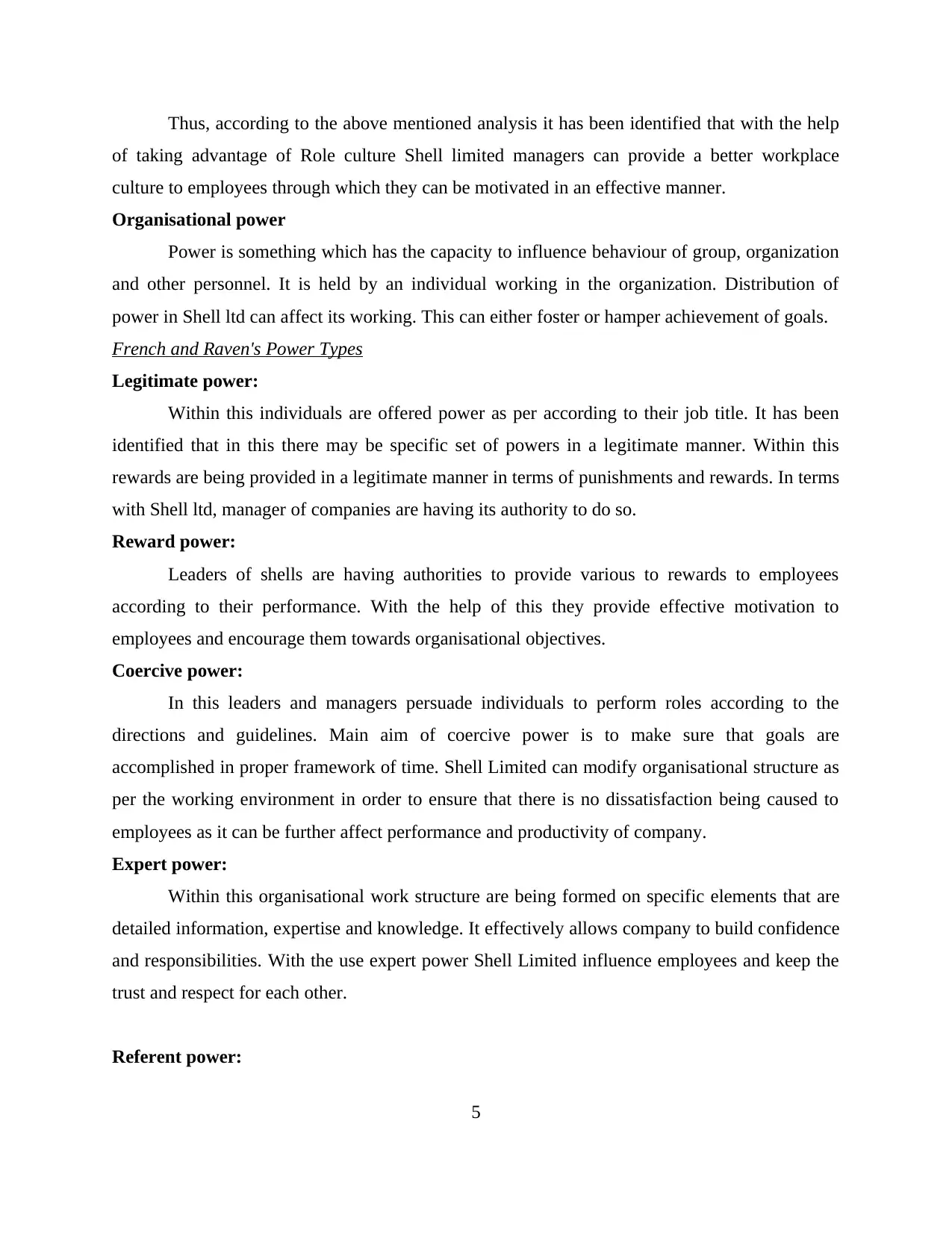
Thus, according to the above mentioned analysis it has been identified that with the help
of taking advantage of Role culture Shell limited managers can provide a better workplace
culture to employees through which they can be motivated in an effective manner.
Organisational power
Power is something which has the capacity to influence behaviour of group, organization
and other personnel. It is held by an individual working in the organization. Distribution of
power in Shell ltd can affect its working. This can either foster or hamper achievement of goals.
French and Raven's Power Types
Legitimate power:
Within this individuals are offered power as per according to their job title. It has been
identified that in this there may be specific set of powers in a legitimate manner. Within this
rewards are being provided in a legitimate manner in terms of punishments and rewards. In terms
with Shell ltd, manager of companies are having its authority to do so.
Reward power:
Leaders of shells are having authorities to provide various to rewards to employees
according to their performance. With the help of this they provide effective motivation to
employees and encourage them towards organisational objectives.
Coercive power:
In this leaders and managers persuade individuals to perform roles according to the
directions and guidelines. Main aim of coercive power is to make sure that goals are
accomplished in proper framework of time. Shell Limited can modify organisational structure as
per the working environment in order to ensure that there is no dissatisfaction being caused to
employees as it can be further affect performance and productivity of company.
Expert power:
Within this organisational work structure are being formed on specific elements that are
detailed information, expertise and knowledge. It effectively allows company to build confidence
and responsibilities. With the use expert power Shell Limited influence employees and keep the
trust and respect for each other.
Referent power:
5
of taking advantage of Role culture Shell limited managers can provide a better workplace
culture to employees through which they can be motivated in an effective manner.
Organisational power
Power is something which has the capacity to influence behaviour of group, organization
and other personnel. It is held by an individual working in the organization. Distribution of
power in Shell ltd can affect its working. This can either foster or hamper achievement of goals.
French and Raven's Power Types
Legitimate power:
Within this individuals are offered power as per according to their job title. It has been
identified that in this there may be specific set of powers in a legitimate manner. Within this
rewards are being provided in a legitimate manner in terms of punishments and rewards. In terms
with Shell ltd, manager of companies are having its authority to do so.
Reward power:
Leaders of shells are having authorities to provide various to rewards to employees
according to their performance. With the help of this they provide effective motivation to
employees and encourage them towards organisational objectives.
Coercive power:
In this leaders and managers persuade individuals to perform roles according to the
directions and guidelines. Main aim of coercive power is to make sure that goals are
accomplished in proper framework of time. Shell Limited can modify organisational structure as
per the working environment in order to ensure that there is no dissatisfaction being caused to
employees as it can be further affect performance and productivity of company.
Expert power:
Within this organisational work structure are being formed on specific elements that are
detailed information, expertise and knowledge. It effectively allows company to build confidence
and responsibilities. With the use expert power Shell Limited influence employees and keep the
trust and respect for each other.
Referent power:
5
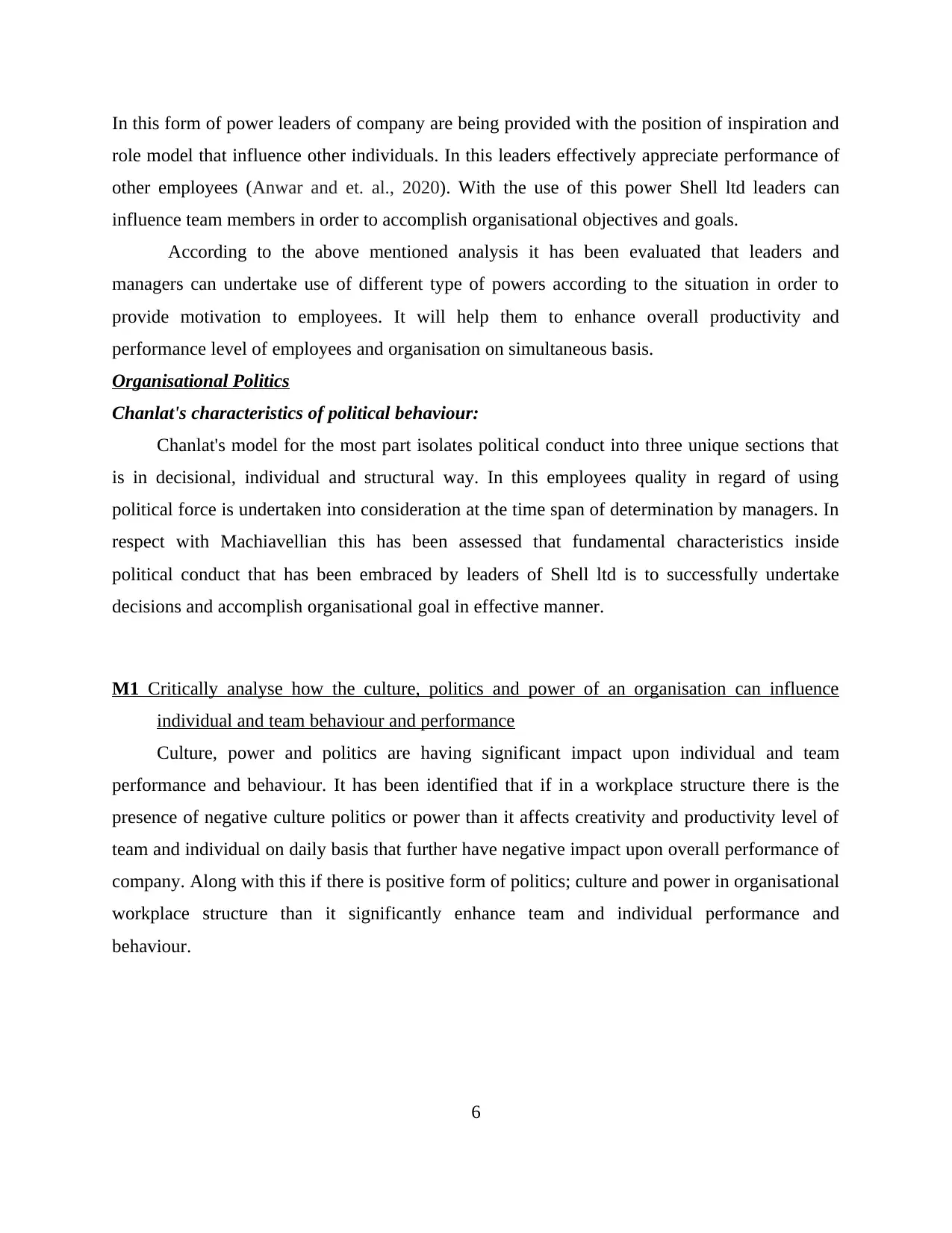
In this form of power leaders of company are being provided with the position of inspiration and
role model that influence other individuals. In this leaders effectively appreciate performance of
other employees (Anwar and et. al., 2020). With the use of this power Shell ltd leaders can
influence team members in order to accomplish organisational objectives and goals.
According to the above mentioned analysis it has been evaluated that leaders and
managers can undertake use of different type of powers according to the situation in order to
provide motivation to employees. It will help them to enhance overall productivity and
performance level of employees and organisation on simultaneous basis.
Organisational Politics
Chanlat's characteristics of political behaviour:
Chanlat's model for the most part isolates political conduct into three unique sections that
is in decisional, individual and structural way. In this employees quality in regard of using
political force is undertaken into consideration at the time span of determination by managers. In
respect with Machiavellian this has been assessed that fundamental characteristics inside
political conduct that has been embraced by leaders of Shell ltd is to successfully undertake
decisions and accomplish organisational goal in effective manner.
M1 Critically analyse how the culture, politics and power of an organisation can influence
individual and team behaviour and performance
Culture, power and politics are having significant impact upon individual and team
performance and behaviour. It has been identified that if in a workplace structure there is the
presence of negative culture politics or power than it affects creativity and productivity level of
team and individual on daily basis that further have negative impact upon overall performance of
company. Along with this if there is positive form of politics; culture and power in organisational
workplace structure than it significantly enhance team and individual performance and
behaviour.
6
role model that influence other individuals. In this leaders effectively appreciate performance of
other employees (Anwar and et. al., 2020). With the use of this power Shell ltd leaders can
influence team members in order to accomplish organisational objectives and goals.
According to the above mentioned analysis it has been evaluated that leaders and
managers can undertake use of different type of powers according to the situation in order to
provide motivation to employees. It will help them to enhance overall productivity and
performance level of employees and organisation on simultaneous basis.
Organisational Politics
Chanlat's characteristics of political behaviour:
Chanlat's model for the most part isolates political conduct into three unique sections that
is in decisional, individual and structural way. In this employees quality in regard of using
political force is undertaken into consideration at the time span of determination by managers. In
respect with Machiavellian this has been assessed that fundamental characteristics inside
political conduct that has been embraced by leaders of Shell ltd is to successfully undertake
decisions and accomplish organisational goal in effective manner.
M1 Critically analyse how the culture, politics and power of an organisation can influence
individual and team behaviour and performance
Culture, power and politics are having significant impact upon individual and team
performance and behaviour. It has been identified that if in a workplace structure there is the
presence of negative culture politics or power than it affects creativity and productivity level of
team and individual on daily basis that further have negative impact upon overall performance of
company. Along with this if there is positive form of politics; culture and power in organisational
workplace structure than it significantly enhance team and individual performance and
behaviour.
6
⊘ This is a preview!⊘
Do you want full access?
Subscribe today to unlock all pages.

Trusted by 1+ million students worldwide
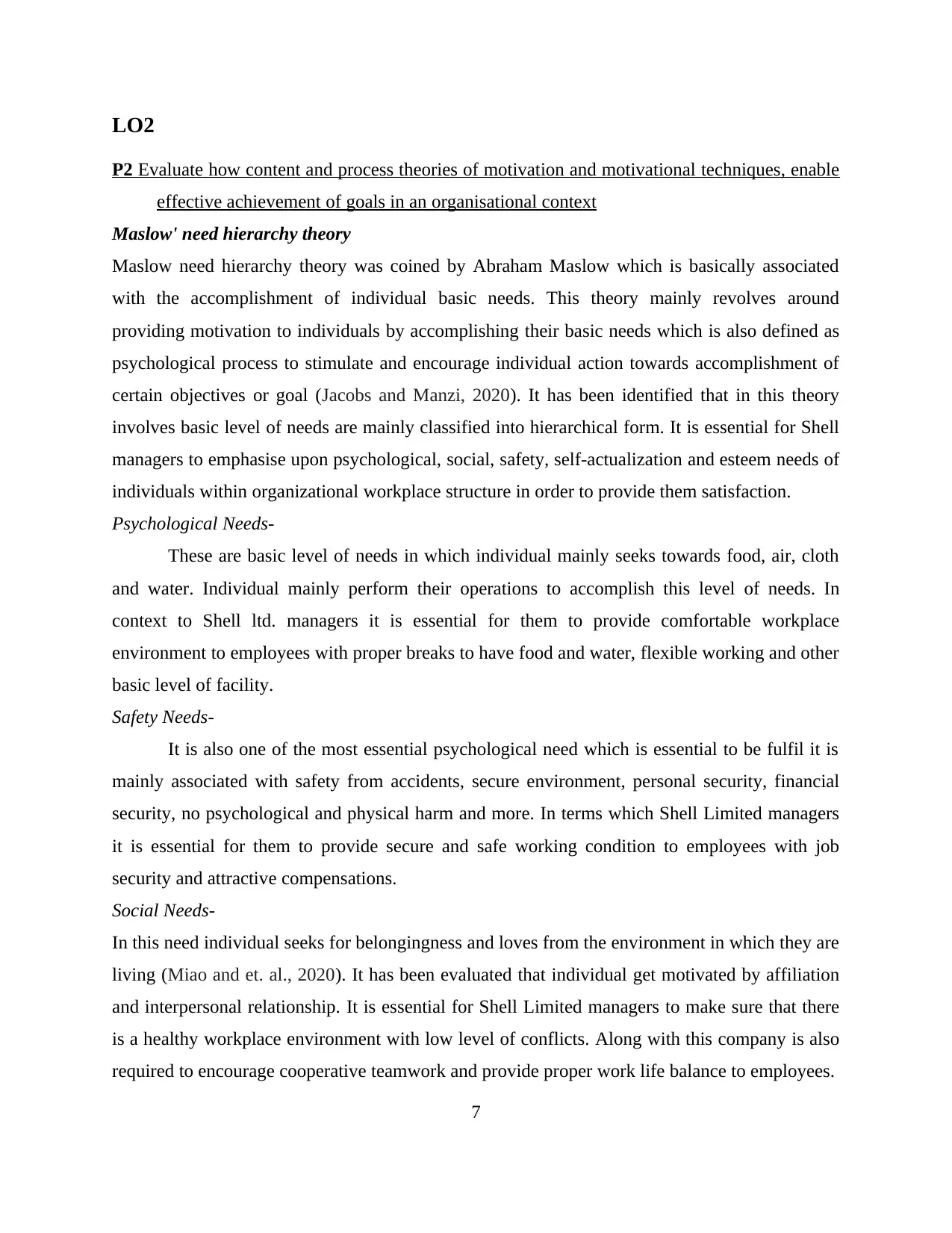
LO2
P2 Evaluate how content and process theories of motivation and motivational techniques, enable
effective achievement of goals in an organisational context
Maslow' need hierarchy theory
Maslow need hierarchy theory was coined by Abraham Maslow which is basically associated
with the accomplishment of individual basic needs. This theory mainly revolves around
providing motivation to individuals by accomplishing their basic needs which is also defined as
psychological process to stimulate and encourage individual action towards accomplishment of
certain objectives or goal (Jacobs and Manzi, 2020). It has been identified that in this theory
involves basic level of needs are mainly classified into hierarchical form. It is essential for Shell
managers to emphasise upon psychological, social, safety, self-actualization and esteem needs of
individuals within organizational workplace structure in order to provide them satisfaction.
Psychological Needs-
These are basic level of needs in which individual mainly seeks towards food, air, cloth
and water. Individual mainly perform their operations to accomplish this level of needs. In
context to Shell ltd. managers it is essential for them to provide comfortable workplace
environment to employees with proper breaks to have food and water, flexible working and other
basic level of facility.
Safety Needs-
It is also one of the most essential psychological need which is essential to be fulfil it is
mainly associated with safety from accidents, secure environment, personal security, financial
security, no psychological and physical harm and more. In terms which Shell Limited managers
it is essential for them to provide secure and safe working condition to employees with job
security and attractive compensations.
Social Needs-
In this need individual seeks for belongingness and loves from the environment in which they are
living (Miao and et. al., 2020). It has been evaluated that individual get motivated by affiliation
and interpersonal relationship. It is essential for Shell Limited managers to make sure that there
is a healthy workplace environment with low level of conflicts. Along with this company is also
required to encourage cooperative teamwork and provide proper work life balance to employees.
7
P2 Evaluate how content and process theories of motivation and motivational techniques, enable
effective achievement of goals in an organisational context
Maslow' need hierarchy theory
Maslow need hierarchy theory was coined by Abraham Maslow which is basically associated
with the accomplishment of individual basic needs. This theory mainly revolves around
providing motivation to individuals by accomplishing their basic needs which is also defined as
psychological process to stimulate and encourage individual action towards accomplishment of
certain objectives or goal (Jacobs and Manzi, 2020). It has been identified that in this theory
involves basic level of needs are mainly classified into hierarchical form. It is essential for Shell
managers to emphasise upon psychological, social, safety, self-actualization and esteem needs of
individuals within organizational workplace structure in order to provide them satisfaction.
Psychological Needs-
These are basic level of needs in which individual mainly seeks towards food, air, cloth
and water. Individual mainly perform their operations to accomplish this level of needs. In
context to Shell ltd. managers it is essential for them to provide comfortable workplace
environment to employees with proper breaks to have food and water, flexible working and other
basic level of facility.
Safety Needs-
It is also one of the most essential psychological need which is essential to be fulfil it is
mainly associated with safety from accidents, secure environment, personal security, financial
security, no psychological and physical harm and more. In terms which Shell Limited managers
it is essential for them to provide secure and safe working condition to employees with job
security and attractive compensations.
Social Needs-
In this need individual seeks for belongingness and loves from the environment in which they are
living (Miao and et. al., 2020). It has been evaluated that individual get motivated by affiliation
and interpersonal relationship. It is essential for Shell Limited managers to make sure that there
is a healthy workplace environment with low level of conflicts. Along with this company is also
required to encourage cooperative teamwork and provide proper work life balance to employees.
7
Paraphrase This Document
Need a fresh take? Get an instant paraphrase of this document with our AI Paraphraser
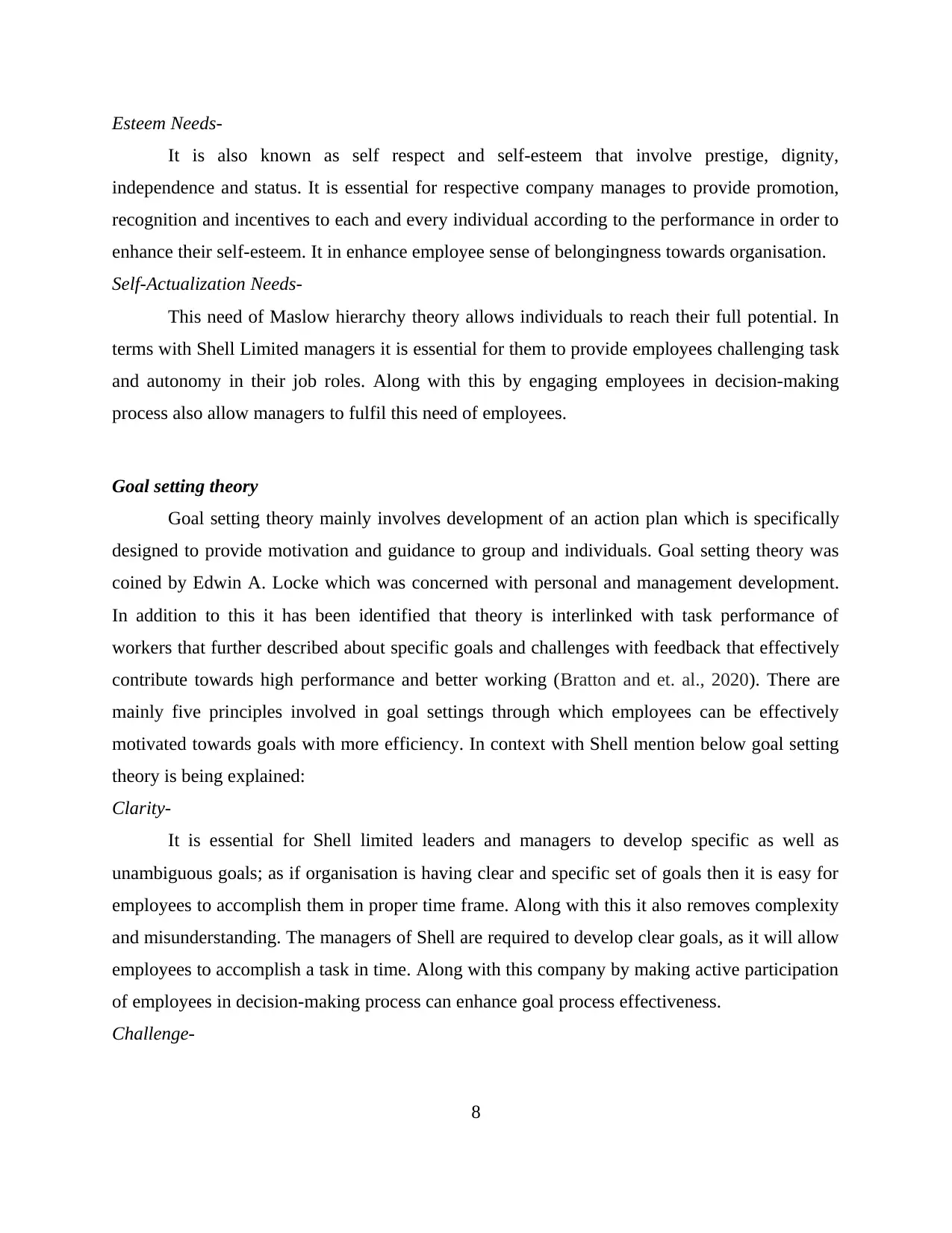
Esteem Needs-
It is also known as self respect and self-esteem that involve prestige, dignity,
independence and status. It is essential for respective company manages to provide promotion,
recognition and incentives to each and every individual according to the performance in order to
enhance their self-esteem. It in enhance employee sense of belongingness towards organisation.
Self-Actualization Needs-
This need of Maslow hierarchy theory allows individuals to reach their full potential. In
terms with Shell Limited managers it is essential for them to provide employees challenging task
and autonomy in their job roles. Along with this by engaging employees in decision-making
process also allow managers to fulfil this need of employees.
Goal setting theory
Goal setting theory mainly involves development of an action plan which is specifically
designed to provide motivation and guidance to group and individuals. Goal setting theory was
coined by Edwin A. Locke which was concerned with personal and management development.
In addition to this it has been identified that theory is interlinked with task performance of
workers that further described about specific goals and challenges with feedback that effectively
contribute towards high performance and better working (Bratton and et. al., 2020). There are
mainly five principles involved in goal settings through which employees can be effectively
motivated towards goals with more efficiency. In context with Shell mention below goal setting
theory is being explained:
Clarity-
It is essential for Shell limited leaders and managers to develop specific as well as
unambiguous goals; as if organisation is having clear and specific set of goals then it is easy for
employees to accomplish them in proper time frame. Along with this it also removes complexity
and misunderstanding. The managers of Shell are required to develop clear goals, as it will allow
employees to accomplish a task in time. Along with this company by making active participation
of employees in decision-making process can enhance goal process effectiveness.
Challenge-
8
It is also known as self respect and self-esteem that involve prestige, dignity,
independence and status. It is essential for respective company manages to provide promotion,
recognition and incentives to each and every individual according to the performance in order to
enhance their self-esteem. It in enhance employee sense of belongingness towards organisation.
Self-Actualization Needs-
This need of Maslow hierarchy theory allows individuals to reach their full potential. In
terms with Shell Limited managers it is essential for them to provide employees challenging task
and autonomy in their job roles. Along with this by engaging employees in decision-making
process also allow managers to fulfil this need of employees.
Goal setting theory
Goal setting theory mainly involves development of an action plan which is specifically
designed to provide motivation and guidance to group and individuals. Goal setting theory was
coined by Edwin A. Locke which was concerned with personal and management development.
In addition to this it has been identified that theory is interlinked with task performance of
workers that further described about specific goals and challenges with feedback that effectively
contribute towards high performance and better working (Bratton and et. al., 2020). There are
mainly five principles involved in goal settings through which employees can be effectively
motivated towards goals with more efficiency. In context with Shell mention below goal setting
theory is being explained:
Clarity-
It is essential for Shell limited leaders and managers to develop specific as well as
unambiguous goals; as if organisation is having clear and specific set of goals then it is easy for
employees to accomplish them in proper time frame. Along with this it also removes complexity
and misunderstanding. The managers of Shell are required to develop clear goals, as it will allow
employees to accomplish a task in time. Along with this company by making active participation
of employees in decision-making process can enhance goal process effectiveness.
Challenge-
8
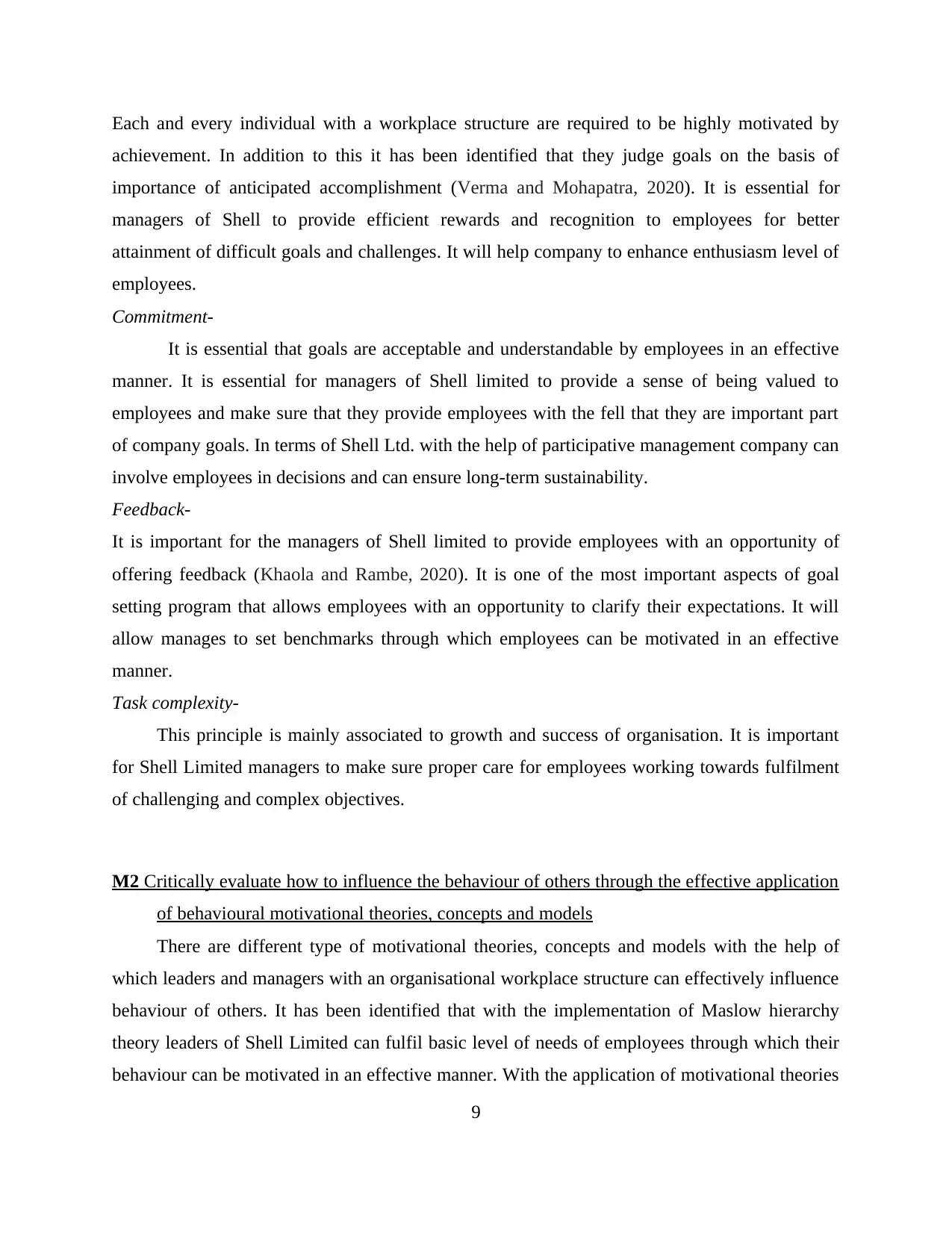
Each and every individual with a workplace structure are required to be highly motivated by
achievement. In addition to this it has been identified that they judge goals on the basis of
importance of anticipated accomplishment (Verma and Mohapatra, 2020). It is essential for
managers of Shell to provide efficient rewards and recognition to employees for better
attainment of difficult goals and challenges. It will help company to enhance enthusiasm level of
employees.
Commitment-
It is essential that goals are acceptable and understandable by employees in an effective
manner. It is essential for managers of Shell limited to provide a sense of being valued to
employees and make sure that they provide employees with the fell that they are important part
of company goals. In terms of Shell Ltd. with the help of participative management company can
involve employees in decisions and can ensure long-term sustainability.
Feedback-
It is important for the managers of Shell limited to provide employees with an opportunity of
offering feedback (Khaola and Rambe, 2020). It is one of the most important aspects of goal
setting program that allows employees with an opportunity to clarify their expectations. It will
allow manages to set benchmarks through which employees can be motivated in an effective
manner.
Task complexity-
This principle is mainly associated to growth and success of organisation. It is important
for Shell Limited managers to make sure proper care for employees working towards fulfilment
of challenging and complex objectives.
M2 Critically evaluate how to influence the behaviour of others through the effective application
of behavioural motivational theories, concepts and models
There are different type of motivational theories, concepts and models with the help of
which leaders and managers with an organisational workplace structure can effectively influence
behaviour of others. It has been identified that with the implementation of Maslow hierarchy
theory leaders of Shell Limited can fulfil basic level of needs of employees through which their
behaviour can be motivated in an effective manner. With the application of motivational theories
9
achievement. In addition to this it has been identified that they judge goals on the basis of
importance of anticipated accomplishment (Verma and Mohapatra, 2020). It is essential for
managers of Shell to provide efficient rewards and recognition to employees for better
attainment of difficult goals and challenges. It will help company to enhance enthusiasm level of
employees.
Commitment-
It is essential that goals are acceptable and understandable by employees in an effective
manner. It is essential for managers of Shell limited to provide a sense of being valued to
employees and make sure that they provide employees with the fell that they are important part
of company goals. In terms of Shell Ltd. with the help of participative management company can
involve employees in decisions and can ensure long-term sustainability.
Feedback-
It is important for the managers of Shell limited to provide employees with an opportunity of
offering feedback (Khaola and Rambe, 2020). It is one of the most important aspects of goal
setting program that allows employees with an opportunity to clarify their expectations. It will
allow manages to set benchmarks through which employees can be motivated in an effective
manner.
Task complexity-
This principle is mainly associated to growth and success of organisation. It is important
for Shell Limited managers to make sure proper care for employees working towards fulfilment
of challenging and complex objectives.
M2 Critically evaluate how to influence the behaviour of others through the effective application
of behavioural motivational theories, concepts and models
There are different type of motivational theories, concepts and models with the help of
which leaders and managers with an organisational workplace structure can effectively influence
behaviour of others. It has been identified that with the implementation of Maslow hierarchy
theory leaders of Shell Limited can fulfil basic level of needs of employees through which their
behaviour can be motivated in an effective manner. With the application of motivational theories
9
⊘ This is a preview!⊘
Do you want full access?
Subscribe today to unlock all pages.

Trusted by 1+ million students worldwide
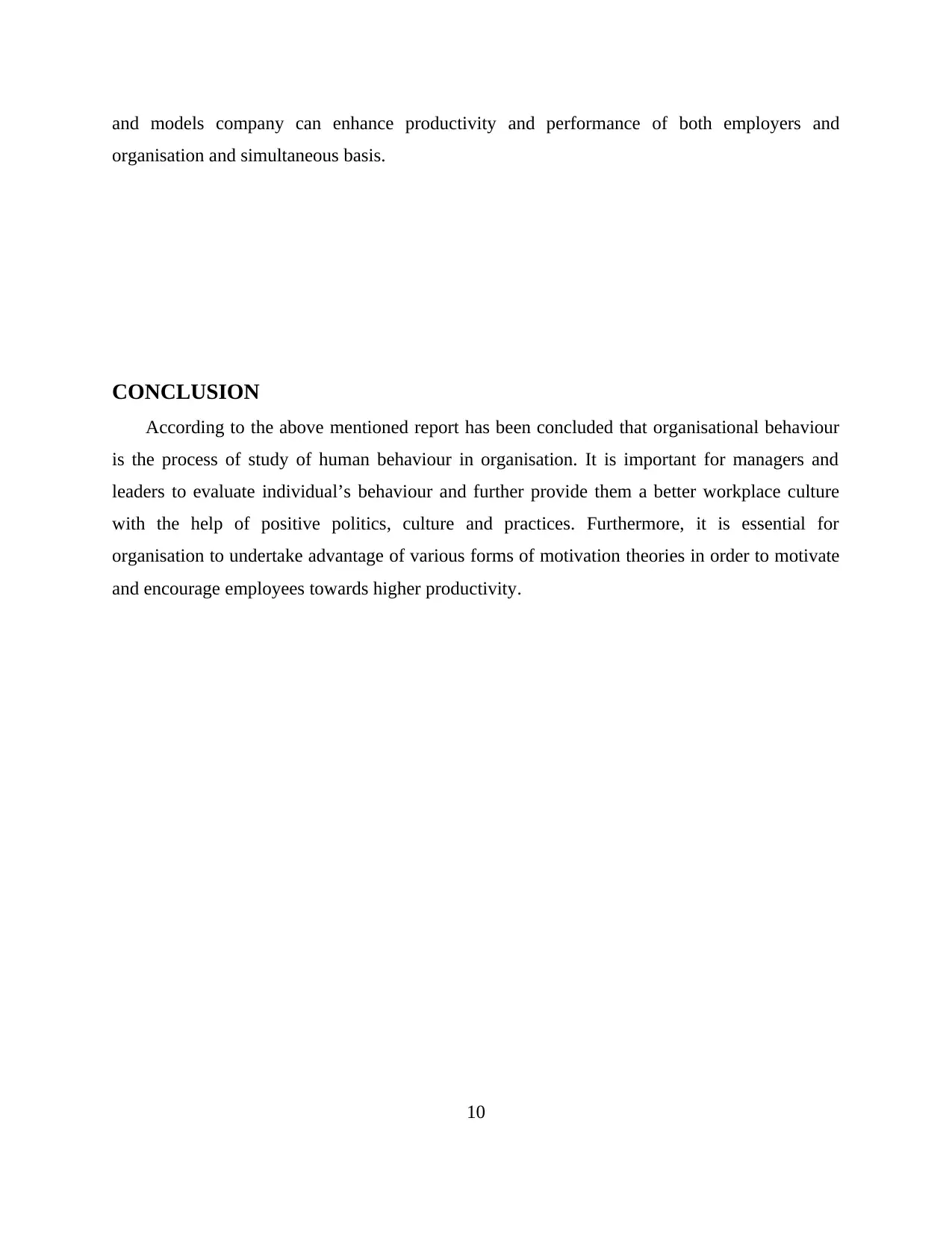
and models company can enhance productivity and performance of both employers and
organisation and simultaneous basis.
CONCLUSION
According to the above mentioned report has been concluded that organisational behaviour
is the process of study of human behaviour in organisation. It is important for managers and
leaders to evaluate individual’s behaviour and further provide them a better workplace culture
with the help of positive politics, culture and practices. Furthermore, it is essential for
organisation to undertake advantage of various forms of motivation theories in order to motivate
and encourage employees towards higher productivity.
10
organisation and simultaneous basis.
CONCLUSION
According to the above mentioned report has been concluded that organisational behaviour
is the process of study of human behaviour in organisation. It is important for managers and
leaders to evaluate individual’s behaviour and further provide them a better workplace culture
with the help of positive politics, culture and practices. Furthermore, it is essential for
organisation to undertake advantage of various forms of motivation theories in order to motivate
and encourage employees towards higher productivity.
10
Paraphrase This Document
Need a fresh take? Get an instant paraphrase of this document with our AI Paraphraser
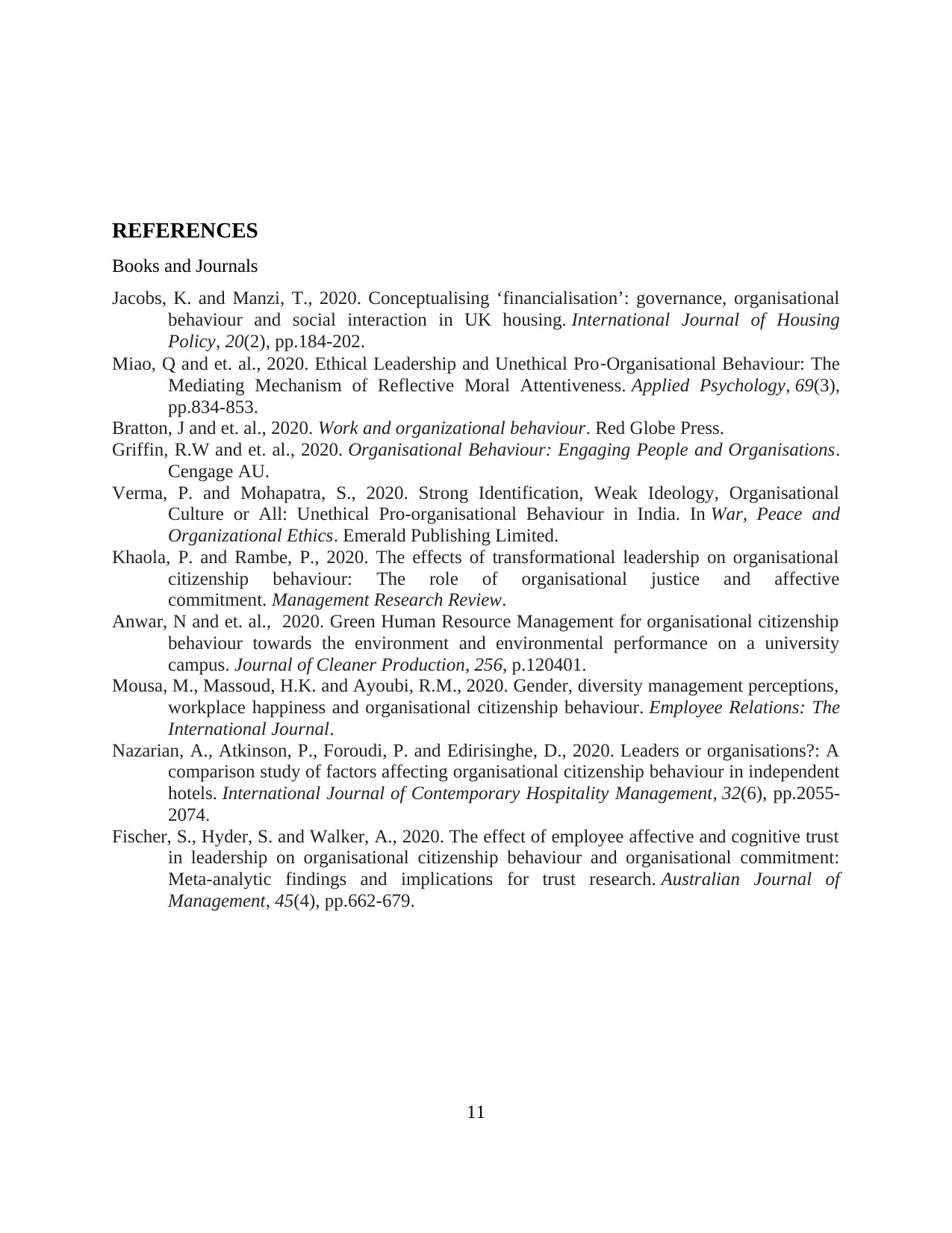
REFERENCES
Books and Journals
Jacobs, K. and Manzi, T., 2020. Conceptualising ‘financialisation’: governance, organisational
behaviour and social interaction in UK housing. International Journal of Housing
Policy, 20(2), pp.184-202.
Miao, Q and et. al., 2020. Ethical Leadership and Unethical Pro‐Organisational Behaviour: The
Mediating Mechanism of Reflective Moral Attentiveness. Applied Psychology, 69(3),
pp.834-853.
Bratton, J and et. al., 2020. Work and organizational behaviour. Red Globe Press.
Griffin, R.W and et. al., 2020. Organisational Behaviour: Engaging People and Organisations.
Cengage AU.
Verma, P. and Mohapatra, S., 2020. Strong Identification, Weak Ideology, Organisational
Culture or All: Unethical Pro-organisational Behaviour in India. In War, Peace and
Organizational Ethics. Emerald Publishing Limited.
Khaola, P. and Rambe, P., 2020. The effects of transformational leadership on organisational
citizenship behaviour: The role of organisational justice and affective
commitment. Management Research Review.
Anwar, N and et. al., 2020. Green Human Resource Management for organisational citizenship
behaviour towards the environment and environmental performance on a university
campus. Journal of Cleaner Production, 256, p.120401.
Mousa, M., Massoud, H.K. and Ayoubi, R.M., 2020. Gender, diversity management perceptions,
workplace happiness and organisational citizenship behaviour. Employee Relations: The
International Journal.
Nazarian, A., Atkinson, P., Foroudi, P. and Edirisinghe, D., 2020. Leaders or organisations?: A
comparison study of factors affecting organisational citizenship behaviour in independent
hotels. International Journal of Contemporary Hospitality Management, 32(6), pp.2055-
2074.
Fischer, S., Hyder, S. and Walker, A., 2020. The effect of employee affective and cognitive trust
in leadership on organisational citizenship behaviour and organisational commitment:
Meta-analytic findings and implications for trust research. Australian Journal of
Management, 45(4), pp.662-679.
11
Books and Journals
Jacobs, K. and Manzi, T., 2020. Conceptualising ‘financialisation’: governance, organisational
behaviour and social interaction in UK housing. International Journal of Housing
Policy, 20(2), pp.184-202.
Miao, Q and et. al., 2020. Ethical Leadership and Unethical Pro‐Organisational Behaviour: The
Mediating Mechanism of Reflective Moral Attentiveness. Applied Psychology, 69(3),
pp.834-853.
Bratton, J and et. al., 2020. Work and organizational behaviour. Red Globe Press.
Griffin, R.W and et. al., 2020. Organisational Behaviour: Engaging People and Organisations.
Cengage AU.
Verma, P. and Mohapatra, S., 2020. Strong Identification, Weak Ideology, Organisational
Culture or All: Unethical Pro-organisational Behaviour in India. In War, Peace and
Organizational Ethics. Emerald Publishing Limited.
Khaola, P. and Rambe, P., 2020. The effects of transformational leadership on organisational
citizenship behaviour: The role of organisational justice and affective
commitment. Management Research Review.
Anwar, N and et. al., 2020. Green Human Resource Management for organisational citizenship
behaviour towards the environment and environmental performance on a university
campus. Journal of Cleaner Production, 256, p.120401.
Mousa, M., Massoud, H.K. and Ayoubi, R.M., 2020. Gender, diversity management perceptions,
workplace happiness and organisational citizenship behaviour. Employee Relations: The
International Journal.
Nazarian, A., Atkinson, P., Foroudi, P. and Edirisinghe, D., 2020. Leaders or organisations?: A
comparison study of factors affecting organisational citizenship behaviour in independent
hotels. International Journal of Contemporary Hospitality Management, 32(6), pp.2055-
2074.
Fischer, S., Hyder, S. and Walker, A., 2020. The effect of employee affective and cognitive trust
in leadership on organisational citizenship behaviour and organisational commitment:
Meta-analytic findings and implications for trust research. Australian Journal of
Management, 45(4), pp.662-679.
11
1 out of 11
Related Documents
Your All-in-One AI-Powered Toolkit for Academic Success.
+13062052269
info@desklib.com
Available 24*7 on WhatsApp / Email
![[object Object]](/_next/static/media/star-bottom.7253800d.svg)
Unlock your academic potential
Copyright © 2020–2026 A2Z Services. All Rights Reserved. Developed and managed by ZUCOL.





